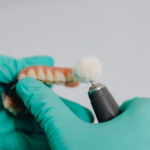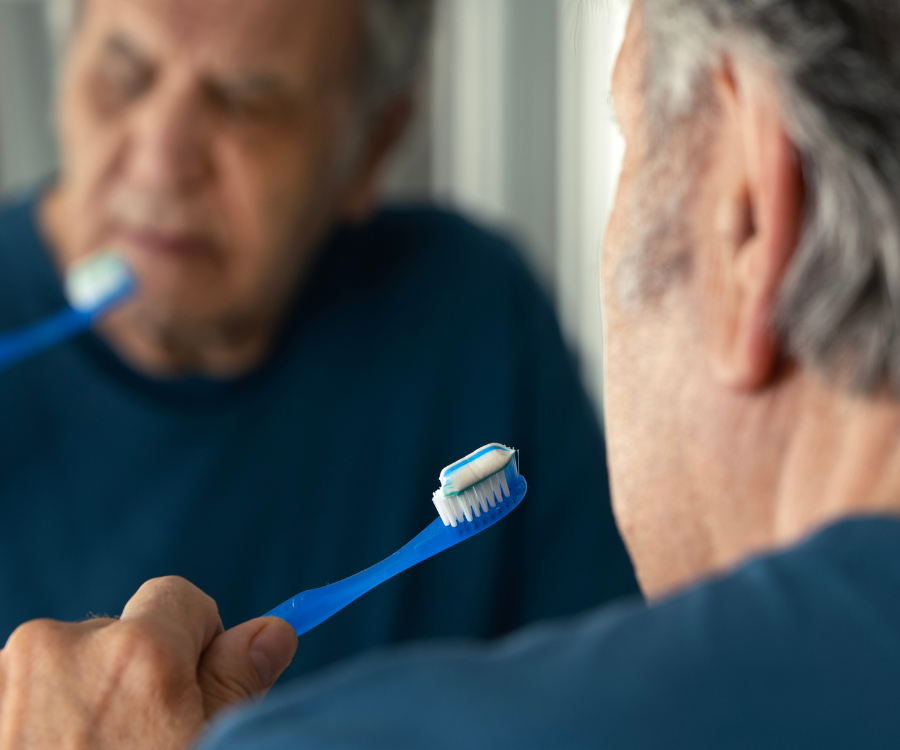Maintaining your smile as you age is about more than just aesthetics; it’s a vital part of your overall health. While dental care for seniors shares some similarities with younger adults, there are key differences and specific challenges to address. By adopting a proactive and informed approach, you can keep your teeth and gums healthy for years to come.
This guide covers the best dental care routine for seniors, including common issues, daily habits, and the importance of professional dental visits.
Common Dental Issues for Seniors
As we get older, our oral health can face new challenges. Being aware of these common issues is the first step toward preventing them.
- Tooth Decay and Cavities: With age, gums may recede, exposing the tooth root. The root is softer than enamel and more vulnerable to decay. Medications that cause dry mouth (a common issue for seniors) can also increase the risk of cavities, as saliva is crucial for washing away food particles and neutralizing acids.
- Gum Disease (Periodontal Disease): Plaque buildup can lead to gingivitis, the early stage of gum disease, which causes inflammation and bleeding. If left untreated, it can progress to more severe forms, leading to bone loss and tooth loss. In fact, nearly 70% of adults 65 and older have some form of gum disease.
- Dry Mouth (Xerostomia): Often a side effect of medication or medical conditions, dry mouth is a significant concern. A lack of saliva can accelerate tooth decay and make it difficult to swallow and chew.
- Oral Cancer: The risk of oral cancer increases with age, especially for those who smoke or drink alcohol. Early detection is crucial for successful treatment.
- Worn-Down Teeth: Decades of chewing and grinding can wear down tooth enamel, leading to sensitivity and a higher risk of decay.
Your Daily Oral Hygiene Routine
A consistent and effective daily routine is the foundation of good dental health.
- Brush Twice a Day: Use a soft-bristled toothbrush and a fluoride toothpaste. Brush for at least two minutes, using small, gentle, circular motions. Make sure to brush all surfaces of your teeth, including along the gumline, and don’t forget to lightly brush your tongue.
- Floss Daily: Flossing is non-negotiable, as it removes plaque and food particles that a toothbrush can’t reach. If you have trouble with traditional floss due to conditions like arthritis or limited dexterity, consider using a floss holder, pre-threaded flossers, or a water flosser.
- Care for Dentures: If you have full or partial dentures, it’s vital to care for them properly. Clean them daily with a denture-care product, and soak them in water or a cleansing solution overnight. Removing them at night gives your gums a chance to rest and helps prevent irritation.
The Right Tools for the Job
Choosing the right toothbrush and toothpaste can make a big difference, especially if you have specific needs.
- Toothbrush: A soft-bristled toothbrush is recommended for everyone, as it’s gentle on gums and enamel. For those with limited hand mobility, an electric or battery-operated toothbrush can be a game-changer. Look for models with timers and pressure sensors to ensure a thorough but gentle clean.
- Toothpaste: Always choose a toothpaste with fluoride to strengthen enamel and prevent cavities. If you have sensitive teeth, look for a toothpaste specifically formulated for sensitivity, which often contains ingredients like potassium nitrate.
Beyond the Brush: Lifestyle and Diet
Oral health is closely linked to your overall well-being. By making smart lifestyle choices, you can support your dental health from the inside out.
- Stay Hydrated: Drinking plenty of water helps combat dry mouth and washes away food particles.
- Eat a Balanced Diet: A diet rich in fruits, vegetables, and dairy can support strong teeth and bones. Foods high in calcium and Vitamin C are particularly beneficial. Try to limit sugary snacks and drinks, as they contribute to tooth decay.
- Avoid Tobacco and Limit Alcohol: Smoking and heavy alcohol consumption are major risk factors for gum disease, tooth decay, and oral cancer. Quitting smoking is one of the best things you can do for your oral and overall health.
Don’t Skip Your Dentist Visits!
Routine dental checkups are more important than ever for seniors. The American Dental Association recommends visiting your dentist twice a year for a checkup and cleaning, but your dentist may recommend more frequent visits depending on your specific needs.
During these appointments, your dentist can:
- Perform a professional cleaning to remove stubborn plaque and tartar.
- Check for early signs of tooth decay and gum disease, which are often painless and can go unnoticed.
- Screen for oral cancer, which is most treatable when caught early.
- Assess the fit and condition of dentures, bridges, or other dental restorations.
- Provide personalized advice on how to manage common issues like dry mouth and sensitivity.
Prioritizing your dental health as a senior is a key part of aging well. By combining a diligent at-home routine with regular visits to your dentist, you can enjoy a healthy, confident smile for a lifetime.








